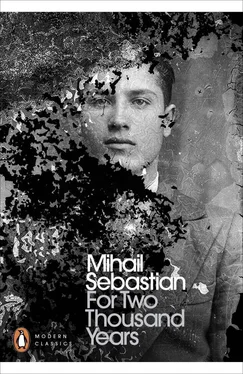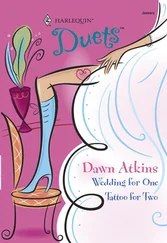‘I’m not boasting, but I can plough very well.’
He says this simply, without giving himself airs, almost with indifference, as if it was the most natural thing in the world.
‘Explain to me, please, why you’re leaving. In 1923 it would have been understandable. But today, now that things have settled down? I’ve the impression that everything has changed over the last five years. It’s safer, there’s more goodwill, more understanding. You can breathe, you can talk with people.’
‘Perhaps. But I’m leaving, not running away. I’m not leaving because it’s bad here and there it’s good, but simply because I can’t live anywhere in the world but there. I’m a Zionist, not a deserter. Listen, in 1923, in the middle of anti-Semitic unrest, Zionism was at its apogee, while today, when everything is calm and prosperous, Zionism finds itself in crisis. But I prefer this Zionism in crisis, because it’s made up of determined people, while the Zionism of 1923 was made up of frightened people.’
*
Evening at Costaridi’s. Long arguments about angst, contemporary neurosis, Gide, the war generation, Berdyaev … I’m amazed at the verve with which people can discuss angst while drinking a coffee. In 1923, in my green notebook period, I would probably have argued passionately. These days I experience a very specific discomfort in dealing with any broad problem, whether it’s angst or destiny or crisis … It’s the abuse of language that puts me off.
Look at Radu Şiriu, broad-shouldered, fit, pink and plump, declaring, with no sense of the ridiculous, as if in a Russian novel:
‘I know nothing, I don’t understand anything: I’m experiencing a crisis.’
How does he manage not to choke on the poor taste of such a declaration? ‘It’s trivial,’ I remark to those around me.
‘Yes, trivial,’ says Ştefan D. Pârlea, picking up the remark from the other corner. ‘Yes, it’s in poor taste. So what? Is that what we need? To be delicate, spiritual, sceptical? A culture based on good manners — it disgusts me. Don’t feel any pain, because it’s in poor taste. Don’t scream, because of what the neighbours will say? Don’t live, it isn’t polite. Dear people, enough of this stupidity. We’ve had ten generations of sceptics who’ve checked themselves in the mirror all the time, with the excuse that they have a critical spirit. I want us to say, to hell with all these proprieties and let’s live. Stormily, without good taste, unrestrainedly and unfastidiously, but with a personal voice, with authentic feelings.’
Pârlea looks straight at me, with barely controlled violence. He polishes his glasses nervously, in order to see me better, his eyes shooting lightning that has been long gathering there to smite me. Beautiful forehead: proud, high, challenging, lit by his flashing eyes, which his short-sightedness makes that bit more intense. I’m attached to this adversity as to a friendship. I can’t explain it, I can’t understand it, but from the first day I sensed in this person an unshakable resolve. And, in a world of easy-going attachments, it’s no small thing to spontaneously earn serious enmity. A raw, healthy human enmity you can really count on.
And more, he’s the only person for whom these vague expressions — crisis, angst, authenticity — have vital meaning. His essay in The Thought — ‘An Invocation for the Barbarians to Invade as soon as Possible’ — showed for the first time the possibility of a spiritual position from which one could say with a measure of justification: ‘We, the young, who have come of age since the war.’ Pârlea’s cast of mind is too lyrical for my taste, while to him I must seem too sceptical. I would like only to make him understand that it’s not possible to be desperate and to hold debates at the Foundation on desperation, or to be anxious and to discuss angst. I’d like to tell him that these things, if they are real, are emotions, and that emotions are for living, not for chatting about. There is some demon of oratory in Pârlea’s nature which impels him towards speechifying, a thing I am altogether incapable of, since all my quarrels are with myself. To argue until two in the morning at Mişu Costaridi’s about ‘angst’ and then go home to bed is the height of comedy. Unfortunately Pârlea has no sense of humour.
S.T. Haim (a good friend of Pârlea’s — since when?) added his own Marxist spiel:
‘An “anxious generation” … How amusing you are, friends. The key to your problem lies elsewhere. You’re a generation of proletarians without class consciousness. There are fewer jobs, the scholarships are miserable, all the places are taken. You’ve been left out and so, for the sake of something to do, you engage in metaphysics. One day you’ll see that the bourgeois democratic state no longer accommodates you — and then you’ll join the revolution. That’ll blow your angst away, you’ll see.’
Only yesterday evening, leaving the office, I remembered it was 10 December. I was with Marin Dronţu, heading down towards Calea Victoriei. It was snowing sumptuously, with immense flakes, like a New Year’s Eve, and there was a real festive bustle in the street, the good-natured hum of a cheerful Sunday. At Capşa’s, on the corner, our way was blocked by a procession of students coming down from University Square.
‘What could this be?’ mused Dronţu. ‘Tenth of December,’ we remembered simultaneously, laughing. I have to admit there was a celebratory air to the whole demonstration, the light-hearted rambunctious mood of the start of the holidays. We stopped along with everyone else at the roadside to watch the march.
‘Down with the Yids! Down with the Yids!’
The shout passed from column to column, syllable by syllable, in a long, winding chain of sound. It was beautiful: I ask myself if that’s a ridiculous thing to say, but it really was beautiful. A crowd of young men — most of them certainly first-year students. Tremendous high spirits, an atmosphere of schoolyard fun. Nothing serious.
We remembered our first 10 December, Dronţu with enthusiasm, me with a trace of bitterness.
‘The blows I dealt that day,’ he testifies.
‘Perhaps you were the one who struck me.’
‘Perhaps. Where did it happen?’
‘In the main lecture hall in Law.’
‘No, I wasn’t there. Us architecture students went to the college of medicine, because we didn’t have enough Jews in with us.’
He is moved, almost. It would be unfair of me not to understand: these are his memories of his younger days. They’re mine too — though they’re less cheerful. In any case, it would be grotesque of me to want to get indignant about these dead and buried matters. It’s not serious or aggressive any more. These ‘Down with the Yids’ of today are almost innocent, almost likable.
We strolled until late, relating innumerable tales of those times. Marin boasted of his deeds.
‘Back then I had a cudgel you wouldn’t believe. The Jews scarpered at the sight of me. I’d become famous at the faculty of medicine. ‘Dronţu from architecture.’ Who hadn’t heard of me? I’m surprised you hadn’t heard of me … I was wild!’
Isn’t it strange that I find myself good friends today with the unhappy heroes from the notebook of 1923?
I couldn’t say exactly how the successive truces which have brought us together were made. In any case, in our first year of university we were thrown into opposite corners, while today we find ourselves together in the same place. It’s no small matter.
A new page has been turned, and new questions arise. The uproar at the university was fine and well, but insufficient. You can’t build a life out of that kind of thing. Not even for those engaged in ‘a struggle to claim their rights’. Nor for us, whose struggle concerned ‘internal problems’.
Читать дальше












